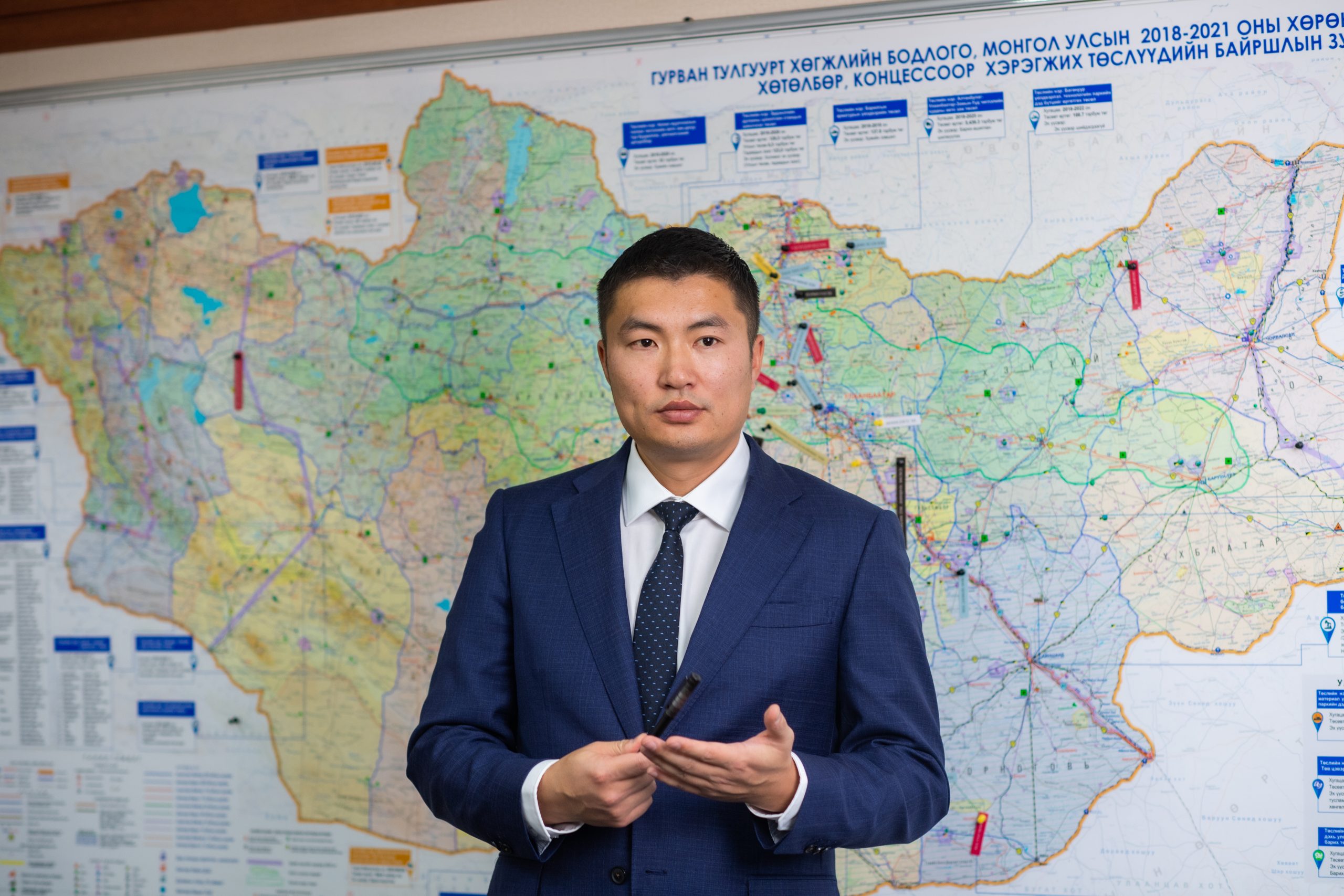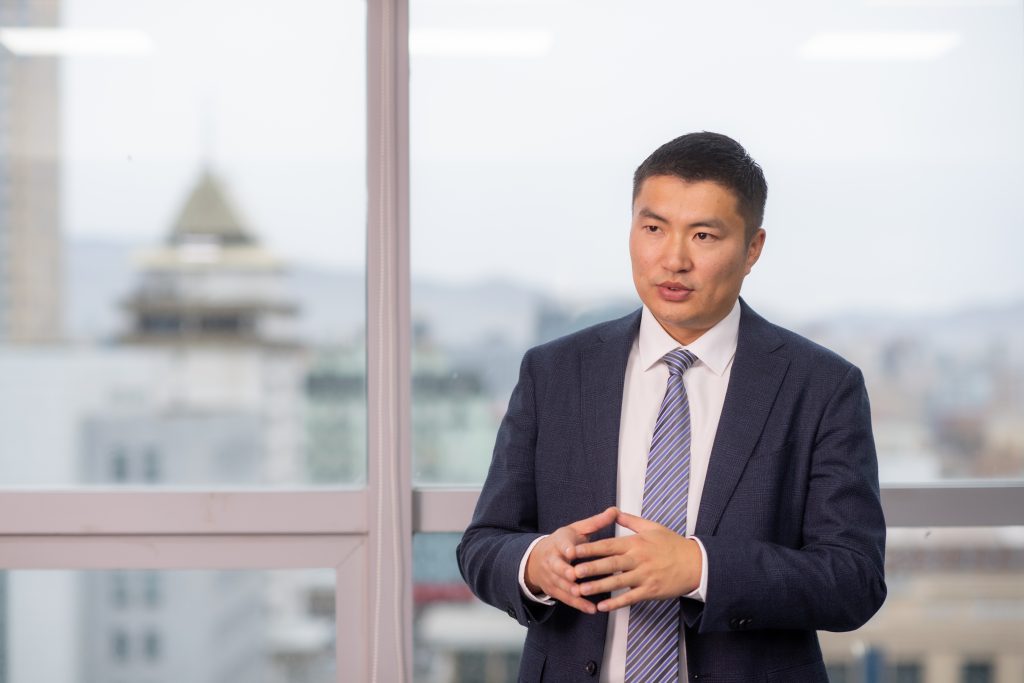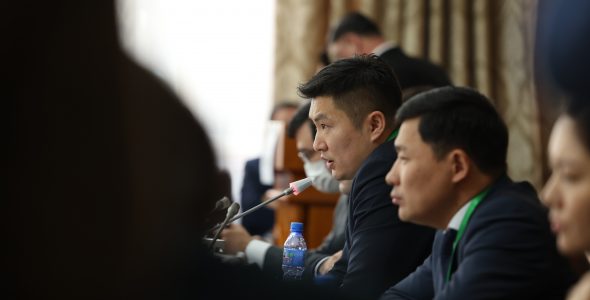N.Manduul: In order for Mongolia to succeed to the next level of development, it must confront with truth

Mongolia Economy interviewed Mr. Manduul. N, CEO of the Development Bank.
-Your whistle blowing statement made on the 20th of January 2022, created the biggest scandal involving white-collar workers, thanks to which Parliament hosted the first analysis hearing for Development Bank cases and recovered public confidence that loans must be paid off. Did you expect that your whistle blowing will yield such a result as we are seeing today?
-After taking office, I made an official request to the Mongol Bank to undertake an audit and investigation of the Development Bank. The law stipulates that Mongol Bank carries out this process. We received the auditing/investigation report that took about two months to compile on the 13th of December 2021. The investigation showed that the situation has worsened. The report was presented to the Government. We warned that the Development Bank is at risk, two large bond repayments are due in 2023 and if the Bank goes bankrupt it would be a default for the bank as well as for the Government.
On the one hand, for the bank not to go bankrupt, the state will have to pay back the loans that have not been repaid. This is, however, not consistent with the principle of justice. On the other hand, I assumed that since the government was aware of the growing injustice and the public outrage, it decided to take it into its own hands and sort out the Development Bank. I was told to take all the necessary measures. Based on these reasons, on January 20, 2022, we made the information public.
-The public is very much annoyed by the fact that the majority of Development Bank loans were not spent for their intended purpose, and many borrowers got loans using their advantage and connections, did not pay off loans, and committed money laundering. What is your position regarding that?
-Firstly, businesses that got loans did not repay those, which was the biggest problem to deal with. More than half of loans granted by the Development Bank had become bad debts with no hope of repayment. A thorough examination of these bad debts revealed that almost half were not spent as per the loan agreements.
Another lesson was that loans were granted not just for major development projects as intended but for commercial projects like commercial banks would do.
Loans were provided for projects that could be financed by commercial banks, such as the construction of housing apartments or small factories costing in the range of 2-3 billion tugrug.
-A three-stage evidence analysis hearing took place in order to make these faults public and discuss them openly. What would you say about the importance and outcome of these hearings?
-I pondered over that a lot before the whistle blowing. When it comes to an individual on such a matter, you will make many enemies, obviously. But the government backed me and on the other hand, my career and my name were clear from any fraud and embezzlement, so I could do my job without fear or favor.
However when you think about the consequences caused in society, first we had to consider what might happen in both the internal and external environment. Regarding internal or bank aspects, we through the year focused on loan repayments, which enabled us to avoid bankruptcy. But that was a by-product. The main result is what was discussed at the hearings. Particularly, after the hearings, the public got full understanding about trihedral network of businesses that obtained loans from the Development Bank, commercial banks, and the government emerged, which hampered the expansion of our economy. In order for Mongolia to succeed to the next level, it must confront the truth. Probably this was the biggest benefit of all.
The hearings have been really fruitful and good for further actions of the Bank. As expected, the people are critical of how it was organized because it is the first time such a hearing was held. But if you look at the bigger picture, it served as a prerequisite for society to get rid of long-lasting injustices and look forward.
-What measures are you taking to get the loans from state-owned companies repaid, which account for a major share of the bad debts?
-By the time I exposed the information, the outstanding loan balance was worth nearly 1 trillion MNT that belonged to state-run companies. When we dug deeper, almost 70 percent were bad debts or at the risk of becoming that. As of today, outstanding loans of state-run companies amount to about 750 billion tugrugs.
There are several projects that were successful as part of the loan repayment campaign. For instance, Erdenes Mongol LLC paid off 117 billion MNT and MIAT fully paid off its loan. Some of state-run companies were insolvent in cash. For example, it turned out that the state-run housing company “TOSK”, that built housing districts and sold them at an affordable price in Buyant Ukhaa #1 and #2/, was incapable of paying off its loan. As a result of negotiations last year, TOSK issued securities guaranteed by its capital for the bank’s ownership. These securities are convertible on the secondary market. By doing so, it is open to selling the securities to a third party to collect the funds for the loan repayment.

-Trials of big companies including “Erel”, “Khutul”, and “Beren” are still under negotiations. It may take 4-6 years to solve the bad debts of these companies. It surely will be a risk for the Development Bank.
-Approximately, loans worth 800 billion MNT were allocated to these three companies and their loans are the major parts of the bad debts in the bank. We are spending much of our time and effort on every one of them. For instance, the Erel company got a loan from our bank to build a prefabricated structures factory. A loan was granted and the factory was built, but there was no buyer. Though Erel claims that the state pledged to buy their products, there is no contract or specific proof of that. Why is the factory standing idle if it is such a good factory as they claim? Several times we proposed to them to start a check to see if it can function properly. Unfortunately, there has been no response from Erel, at all. On behalf of the Erel company, we are still in consultations with the city administration and construction ministry to find a solution.
In the case of the Beren company, they started a steel mill in Erdenet, but cannot maintain enough production. When we demanded they continue with the production and repay the loan, they just say that they need an additional loan because they have no resources to continue the production. We cannot give any additional loans to the company that has already taken out such a large loan, because we do not know if the plant will ever be profitable.
Our bank is taking various measures like offering these projects to foreign investors through our own channels.
-How many deals has the bank made in the past to ensure loan repayments? Apart from the loans that are in the court at the moment, what is the percentage of loans that have been solved through negotiations?
-Last year we had more than 1,000 meetings with borrowers, meaning three or four meetings daily. We also received nearly 300 official letters and requests and sent more than 600 letters and responses to various borrowers.
Since I started my office, I have sued against twenty borrowers. Of course, it is not something to be proud of but we didn’t have any other choice. We don’t just sit and await a judgment from court, but we are making various deals in order to get the loans repaid. Of 43 cases brought to civil court, 27 have been finalized.
Last year, cases of twenty-four other borrowers associated with our bank were finally resolved in court. But after the court verdict is passed, it is often stuck in some judicial decision execution body. After the security being assessed for sale comes at an auction, the borrower sues and indicates that he disagrees with the assessment. Hence, the case can take 1-3 years at the court and then another 2-3 years for execution of the judicial decision.
Looking at the big picture, this system causes troubles not only for our bank but also for other commercial banks. I think commercial banks count the risk of court procedures and increase interest rates upon issuing loans and I believe that this is one of the major reasons why the interest rate of loans is not going down in Mongolia. Therefore, if we don’t resolve such disputes more effectively, it becomes a bottleneck and an obstacle in business relations.
-Shortly after you took office, the Board of Directors was dissolved and a new one was appointed. In your opinion, what principles should the Development Bank’s Board of Directors follow to be compatible with the bank’s operations?
-The Board of Directors of our bank comprises government representatives and independent members. According to the Law on the Development Bank, the main decisions are made by the board, and there are only a few issues that can be resolved at the executive management level. However, because the board members have limited opportunities to participate in the day-to-day activities of the bank, they may not be able to get full information about the subject matter or may not have adequate banking and financial knowledge, and that are factors that in turn create risks for the bank.
In my opinion, the people who in the future will be appointed to the board should be provided with proper working conditions and opportunities, and the boundaries of decisions made at the level of the board and executive management should be clarified. In this way, they can not only exercise their rights, but also fully take on their responsibilities.
There were cases where many people who previously worked at the bank were summoned to court. It should be noted that I am worried they might be defamed for affixing their signatures when they were not well informed about the subject matter.
The board is now totally replaced with new members. The newly-formed board is very supportive to us and coordinates well with the executive management in order to solve the issues.
-Such a history is likely to repeat itself unless the Bank operates completely free from political influence, even if it changes its name and status. Therefore, there will be a need to secure independence from the legal aspect. What changes are necessary for the Law on the Development Bank for this purpose?
-The Bank believes that the law should undergo some amendments and we have already delivered our proposals to amend the law, to the Finance Ministry in 2022. So far, no decision has been made in this regard. Since then, many events have occurred and time has passed. Thus, we are preparing to submit our proposal on the law amendment again to the board of directors and to the government. First, the law should clearly define how the Development Bank will be involved in the financing of large projects. It looks like in the process of the implementation of the existing law passed back in 2011, CEOs just got orders from ministers or some high officials. However, with new changes in the law introduced in 2017 to change this wrong practice, the Board was empowered to decide which projects can receive financing. The result was that the Development Bank was able to decide on projects that commercial banks may not want to take on.
 In my opinion, development projects should be determined both by a parliament elected by the people and the government. However, the Development Bank must independently assess and decide whether the loans for any project can be paid back by the borrowers.
In my opinion, development projects should be determined both by a parliament elected by the people and the government. However, the Development Bank must independently assess and decide whether the loans for any project can be paid back by the borrowers.
The second issue requiring change is inspections. Since its establishment, our bank has undergone fourteen inspections in total and received 400 conclusions and recommendations. A study showed that about forty percent of these recommendations were fulfilled. We have managed to increase their fulfillment up to sixty-four percent. In short, we have to make it clearer which mechanism the government should use in order to operate and control the bank that issues loans on behalf of the state.
– There is a conversation about introducing EXIM bank functions into the Development Bank in the future. As a person managing this bank, what is your position regarding this?
– Internationally, the functions of such banks are basically similar to those mandates set forth in the Law on the Development Bank. In the beginning, such banks finance big projects by issuing loans, and after the country’s economy expands and reaches a new level of development, development banks provide guarantees rather than issuing loans. For example, 80-90 percent of Export Credit Agency (ECA) portfolios in developed countries are guarantees.
The main point is that if a company in one country decides to implement a project in another country, the bank guarantees that it will share the risk of the loan allocated for that project. This is one of the most common ways of supporting domestic enterprises. Currently, there is no such opportunity in our country.
– As we know some projects failed and did not succeed. But, there are some others that were successfully implemented thanks to loans from the Development Bank. Which ones would you emphasize?
– Not all projects and loans have failed, I can say. There are good examples too. Here we should mention big energy projects like the Amgalan thermal power plant and the capacity extension of power plants #3 and #4. Domestic cement plants have opened too.
In the future, our bank will function within the framework of the New Revival policy only. It will not be involved in any other projects.
For example, the government emphasized that the Bank will no longer finance housing projects.
But the main point is there are no ready projects in place. In order to raise investment from abroad, we must present the project information to investors. In the last decade, we established good communication and cooperation with external international financial colleagues. In order to get funds, we need to present full information. But sometimes lack of information can become obstacles to our cooperation.
Last year, we not only focused on loan repayment, but we also worked toward the future. The principal function of the Bank is to keep sources and channels open abroad.
In such a big flow of negative information, it is important to provide foreign investors with accurate information in order not to lose their confidence. We enjoy a good reputation to hold business-like talks with foreign investors as our bank managed to retain our credit rating in 2022. Furthermore, we have to talk about actual projects and funds.